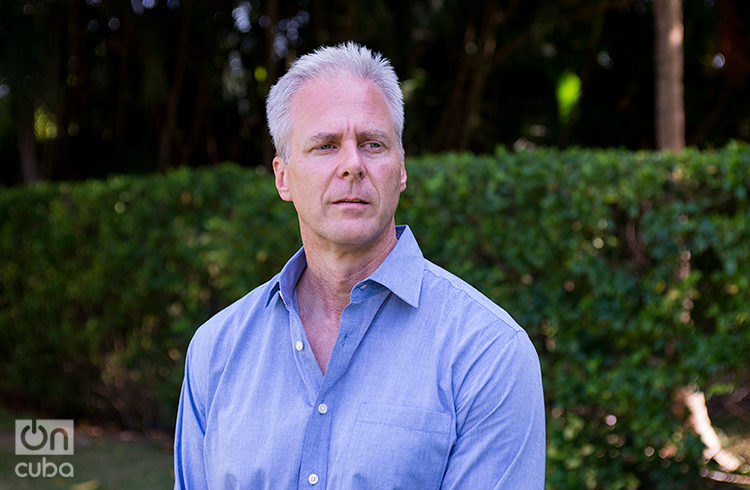Florida-based Stonegate Bank has gone from being a quite unknown name to becoming the first bank in the United States to sign a correspondent agreement with a Cuban financial institution, a historic step that will be crucial in expanding commercial relations between the two countries.
The agreement was reached on Tuesday, July 21st, with Banco Internacional de Comercio S.A. (BICSA), a bank founded in 1993 that, according to a profile published on the official website of the Central Bank of Cuba, “has an ample network of first-level correspondent banks, mainly in Europe, Asia and the Americas.”
Once the agreement is operational, in three to four weeks, it will be possible, for the first time in decades, to make direct transactions between Cuba and the United States, instead of having to use a third country in the process.
Both parties conducted 90 intense days of due diligence before reaching this point, Stonegate Bank President David Seleski told OnCuba in an exclusive interview during his stay in Havana for the signing of the agreement.
In the difficult art of coming to an understanding with Cuban institutions, a couple of elements have worked in Stonegate Banks’s favour. The most important is probably the bank’s step forward in responding to a request of the Department of State in early 2015, when they were looking for a bank willing to provide services to the Cuban Interests Section in Washington, at a time when that diplomatic mission was sort of “untouchable”, financially speaking, in U.S. territory.
Additionally, Seleski’s commercial approach in doing business with Cuba may have done its part in portraying him as a desirable partner for the Cuban part, in that he does not come across as the impatient foreign banker who does not understand the other side’s proceedings and wants to do things his way, but as a businessman who since 2011 has been getting familiar with Cuban regulations and its banking system, and understands the need to advance at a pace and in a way that suits both sides’ interests.
“Our previous experience in Cuba was an advantage. We had gone through hurdles that other people had not. We already knew how the licensing system worked, and what was permitted and what wasn’t,” said Seleski.
He also explained that their dealings with Cuba are not part of an exception to embargo regulations. “The Federal Registry allows for a U.S. bank to provide services to the Cuban diplomatic mission in the United States, and to enter into a correspondent relationship with a Cuban bank. That is, we can give services to the Cuban Embassy and Cuban banks,” he said.
With regards to the Cuban side, Seleski said that the Cuban government is very cautious when doing business. “They look into every issue. They don’t just jump into anything. They did their own due diligence on us as well,” he said.
He also said that his Cuban counterparts had shown a high professional level: “Cubans conduct their risk assessment the same way we do in the United States. They are also relying on parties in the U.S. that understand U.S. law to help them. So it’s not just one person making the decisions.”
In reference to the obstacles that still interfere with a more rapid interaction between the two countries, he spoke of the embargo and other restrictions that need to be overcome. “But it’s not only the American side,” he said, “it’s also the Cuban side, mainly in terms of regulations.”
“What we want is to speed up the process to transfer money from one country to the other and make it more efficient,” said Seleski. “That’s what we are focused on now essentially.”
Currently, any transaction involving Cuban banks is slow and complicated. Not only the money has to go through a bank in a third country -something that necessarily makes the process slower- the transferred amount also has to be exchanged from one currency to another at least twice.
“Right now transactions have to be done through Canada or Europe, to use an example, where the money needs to be exchanged to Canadian dollars or Euros, respectively. Then, when it gets to Cuba, it has to be exchanged to CUC [Cuba’s hard currency].”
“Many times there are also problems because some banks are not sure about whether processing transactions involving Cuba is permitted or not, so they may be held and this, of course, delays the process. It’s simply not efficient the way it is,” he said.
“The most important thing would be that Cubans were allowed to operate in dollars,” Seleski noted. “That would definitely contribute to facilitate things considerably.”
A preliminary study conducted by Stonegate Bank showed that direct transactions would lower current costs by 1% to 4%.
“This would make American products more competitive than products from other countries in the Cuban market,” he added.
In reply to OnCuba’s question about how this deal would benefit the use of American credit cards, especially in connection with MasterCard’s announcement in early 2015 that they would start operating in Cuba soon, Seleski explained that all that is only possible through agreements like the one his bank signed on Tuesday with Cuba.
“MasterCard obviously was expressing an interest in moving forward but the possibility of using a credit card also depends on the issuing bank. Also, this is something that was not possible without this correspondent relationship,” he said.
With regards to their plans to expand to other areas, such as remittances or online payment systems like PayPal, Seleski said that they have been contacted by interested parties, but that there is nothing conclusive yet.
“We are exploring other avenues,” he concluded. “We have many plans but we haven’t conducted the necessary research yet so it’s too soon to say which areas would be of interest to us. For now, we’ll focused on moving forward with the correspondent agreement.”










